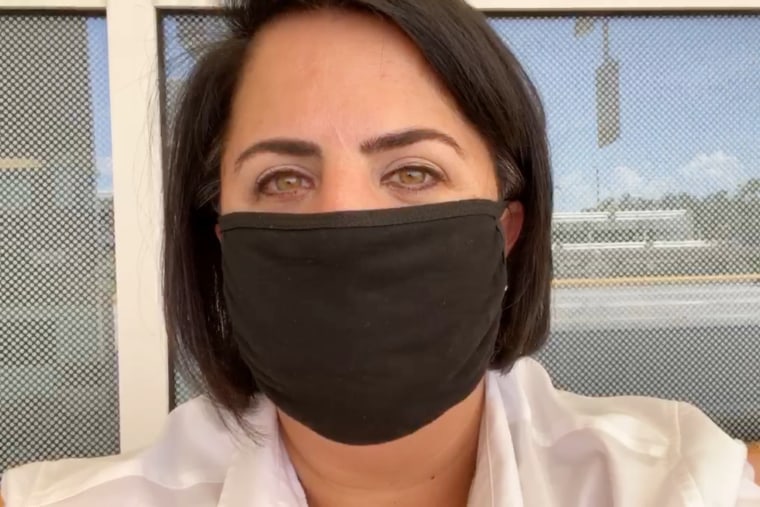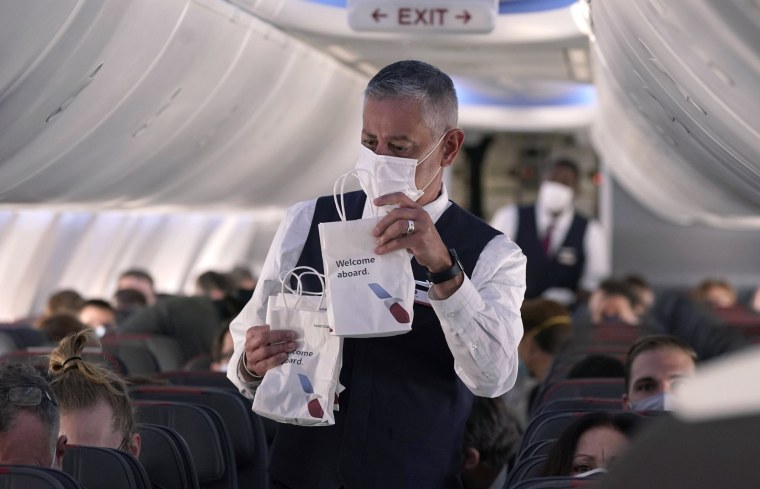Flight attendants say they’re battling Covid-19 risks, depression and erratic schedules and pay, all while being treated as the “mask police” by a hostile public.
Many said they have added new steps to their routine. They carry two sets of hand sanitizer, in case one pops from cabin pressure. They avoid eating or drinking on the plane — but if they do, they try to “dip and sip,” briefly lowering their mask to take a swig of water. When they enter a hotel for a layover, they wipe down every knob and light switch with a Clorox wipe, and try to use an app to change the TV channels to avoid touching the remote. To avoid expensive food and decrease the risk of contamination, they’ve snapped up Hot Logic warming lunch bags that let them reheat and even make food in their rooms.
When they get home, they strip off their uniform in the garage and spray it down with Lysol before greeting their families.
Over 3,500 flight attendants have tested positive for Covid-19 over the course of the pandemic and an estimated 20 have died, according to the latest figures tracked by the Association of Flight Attendants union (AFA-CWA).
Mitra Amirzadeh, a 38-year-old flight attendant and mother of an eighth grader, said her husband was not very happy about her working during the pandemic but they didn’t have a choice.
“The bills keep coming, regardless of whether or not we felt comfortable having me work,” said Amirzadeh, an AFA-CWA member based in Orlando, Florida, at a low-cost carrier. “It really wasn't an option. I had to work.”
She wasn’t furloughed, but others who were had to take steps they never imagined just to survive as passenger traffic plummeted.

In a typical week during the pandemic, flight attendants may find themselves packing twice as much, in the likely case their two-day trip ends up being six days due to cancellations and rescheduling.
Having been told they are essential workers, many had to fly National Guard and Cleveland Clinic personnel to hot spots, while their families waited anxiously at home.
Flight attendants were all given slips of paper to carry in case they were stopped that said they were essential and important to the work effort.
Congress has passed $44 billion in payroll support for the airline industry in three waves since last March. The latest, passed as part of President Joe Biden’s $1.9 trillion stimulus bill, provides an additional $14 billion in payroll support until September, funding about 60 percent of payroll costs, with restrictions on executive pay and share buybacks.
The funding was originally conceived as a bridge last spring to what was predicted to be a return to normal by fall. However, despite employee reduction methods that included early retirement and buyouts, funding lasted only until last September. When the deadline hit, airlines were forced to furlough tens of thousands of employees who had little choice but to wait for political gridlock to ease and vaccinations to pick up.
Brittany Riley, a United AFA flight attendant who went on voluntary furlough during the downturn, said her family started a GoFundMe page when her medical benefits expired and the family faced health expenses. She also had to swallow her pride and apply for SNAP benefits, also known as food stamps.
“For so long I was able to take care of my family and myself because I was with a good company,” Riley told NBC News. “When that’s taken away from you, you feel defeated. I felt like a loser.”
Flight attendants say they’re suffering from high levels of stress and depression.
“Like many people, mental health really took a toll,” said Amanda Steinbrunn, also a United AFA flight attendant. She was exposed to Covid-19 during a flight to the U.K. early in the pandemic and had to quarantine.
“The year before was a record high of pay and working. Now I’m upside down, don’t have a job, don’t have health care ... and terrified what my future could hold.”
“I’m five years in and getting furloughed, while the year before was a record high of pay and working,” she said. “Now I’m upside down, don’t have a job, don’t have health care, stuck with nothing to look forward to and terrified what my future could hold.”
Steinbrunn said she is waiting to be requalified to fly, but because of a backlog and reduced class sizes, it may be a few months.
“I never encountered a thing before, besides 9/11, where in just a few days, everything in the world changed,” she said. “I really got into Doctor on Demand,” a telehealth app, “to talk to a licensed physician, have some therapy going on from home. I can’t go into an office,” Steinbrunn said.
One of the biggest stressors for flight crews has been dealing with passengers who don’t want to follow the federal mask mandate.
“I try to be relatable. I say it’s not my rule, please just work with me,” Amirzadeh said. “But if we get to the point where we're not working together, and being rude, it’s a whole different ball game,” she said. “My mom voice comes out.”
She said she explains what will happen next if the passenger does not comply. Still, she’s had two passengers who had to be placed on the no-fly list.
“I’m just trying to do my job,” she said.
Flight attendants say prospects are starting to brighten as they and their colleagues receive vaccinations and are starting to be recalled from furlough thanks to the extension of payroll support, and air traffic picking up again. Last week, passenger totals hit their highest since the pandemic began.
“Airports are starting to come to life,” said Bryon Sutherland, an American Airlines flight attendant, in an online message. “I’m grateful for full flights, and this weekend, my flights are packed.”

